
september 2004
.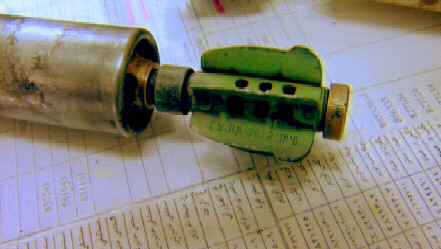
The incident went largely unreported. No articles
were written in major US newspapers. Fox News and 60
Minutes did not produce special reports. The story
gradually grew old and fell through the cracks. Out of
sight and out of mind – and who would believe that
the Israeli military would do such a thing to civilians
in a refugee camp? Olivier Rafowicz, an Israeli Army
spokesman, was furious that I even dared to ask him about
the gas when I interviewed him in Tel Aviv on April 10,
and he repeated the same angry denials. I did not tell
him what I had witnessed and filmed. I make these
transcripts available in order to set the record
straight. I filmed many other interviews with patients,
doctors, etc., but the accounts tend to vary only in the
details. - James Longley,
February 2, 2002
Regarding the use of an
unidentified gas\par by the Israeli Defense Forces During
the week of February 12, 2001
In the Khan Younis Refugee Camp Recorded for the
documentary film, “Gaza Strip”
ISRAELI MILITARY USING
POISON GAS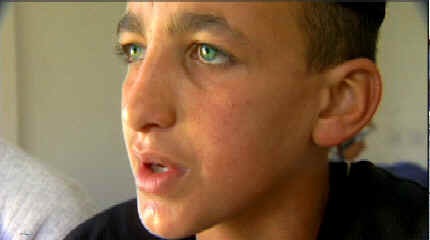
We want an antidote to this gas, so we can treat the
people Not just any old medicine.... This is what we
want.
We were just sitting .We heard that
Mohammed joined a demonstration at a checkpoint. They
(the IDF) fired gas canisters to break up the
demonstration. He breathed some of the gas. He went to
his mother and she sent him to the doctor. She told the
doctor what happened.
When he went to the doctor, he told him that he was
itching and had a bad headache The doctor sent him home.
But he kept having the symptoms. He told his mother that
he is having a headache and itching And then he started
getting violent, hitting himself, his face Then his
father and his cousins came and took him to the hospital
in the ambulance he was hitting everything and everybody.
They took him to the ICU and gave him injections. They
gave him injections to calm him down. But every two hours
he would wake up and have the same thing. After the
effect of the injection wears off he starts breaking
everything and hittingeveryone, anyone who comes near him
– he strikes out at them They took him to intensive
care and he stayed there for 5 days. They kept giving him
injection after injection – but the drugs wore off
in a couple of hours and the symptoms continued. After he
left ICU they kept giving him injections but they would
wear off . Doctors said that there is no cure for his
case.
He can become addicted to the injectionsHe was discharged
and went home But he kept on having the symptoms over and
over. After we heard about it we were very frightened.
When Shadi and I visited him in the ICU, he looked dead,
I was so shocked I couldn’t even look at him. After
he left and went back home, he didn’t improve at
all. He was discharged and went back home He kept having
the symptoms every other hour He gets violent Hits
himself, his mother, everyone. He breaks things in the
kitchen – dishes, kitchen supplies And he hits
himself, scratches himself so badly. Then we took him
back to the hospital His case has no cure.Unless they
send some medication from abroad.
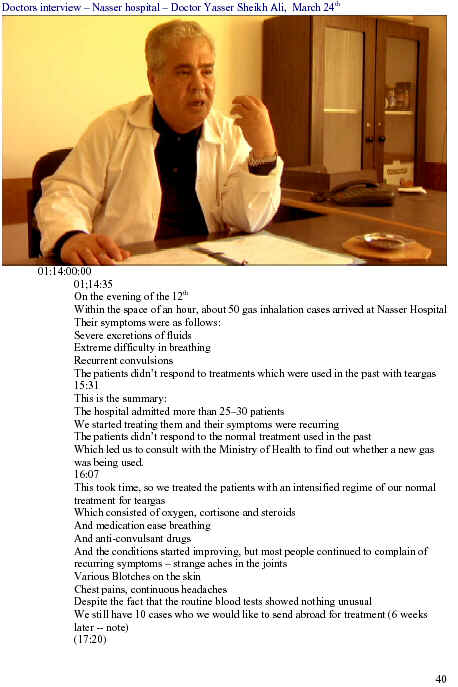
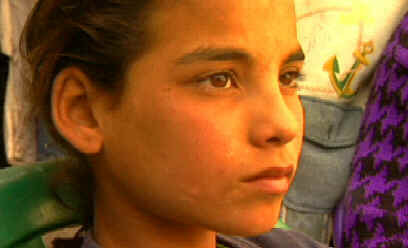 I
was going home from school – and there was a lot of
shooting back and forth Then they fired gas I reached the
house and I collapsed at the door My aunt came and took
me inside and then to the hospital At the hospital I had
a lot of stomach cramps The doctors came and took me
upstairs and admitted me
I
was going home from school – and there was a lot of
shooting back and forth Then they fired gas I reached the
house and I collapsed at the door My aunt came and took
me inside and then to the hospital At the hospital I had
a lot of stomach cramps The doctors came and took me
upstairs and admitted me
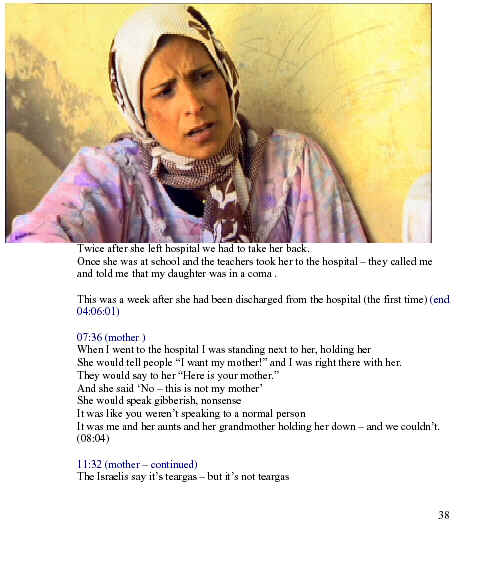
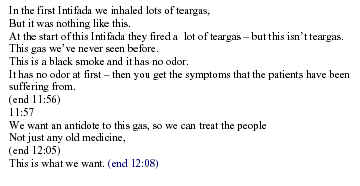
– Interview in Amal hospital
with doctor in metal-rim glasses in ICU Dr. Salakh Shami
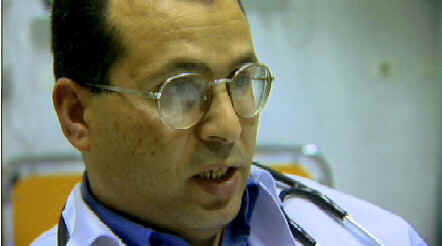
The Amal Hospital received about 130 patients suffering
from gas inhalation. From Feb. 12, 2001 About 100 of the
patients went to... (the Dept. of Internal Medicine?) And
some went to the intensive care unit
As for their symptoms They varied from patient to patient
(1)There was one group of patients suffering from
hysteria.
(2)And others were suffering convulsions.
(3)Another large group was suffering from difficulty
breathing and a burning pain in their eyes and chests
(4)There were also patients suffering from stomach pains
and severe headaches
We treated the patients with the medicines we had
available. Some patients stayed in the hospital for a
couple days, some stayed for a week and others for 10
days.
WHY HAVE THESE INTERVIEWS
TAKEN SUCH A LONG TIME TO SURFACE SINCE JAMES LONGLEY
UPDATED THEM?
FURTHER INTERVIEWS
WITH AMBULANCE DRIVERS AND VICTIMS CAN BE READ AT:
http://www.littleredbutton.com/gas_interviews/interviews.pdf
Copyright 2001 Deutsche Presse-Agentur Deutsche
Presse-Agentur. 1
February 14, 2001, Wednesday, BC
Cycle 00:45 Central European Time
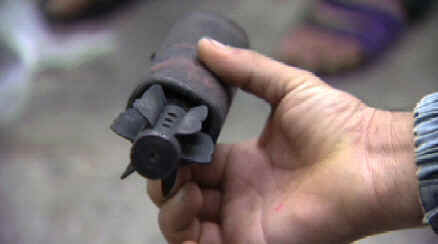
UPDATE:In an October 9, 2003
article, Jennifer Loewenstein and Angela
Gaff asked, "What gas is Israel using?" They
reported the story of Mukhles Burgal, a Palestinian
prisoner caught in a brutal attack inside Israel's
Ashkelon prison. The "guards forced their way into
the crowded cell, spraying two canisters of some type of
gas. Some of the 14 prisoners passed out...The effects of
the gas were severe muscle spasms and an overwhelming
sensation of not being able to breathe." (33)
Two days later, Palestine Monitor reported that Israeli
forces in Rafah were allegedly "firing gas grenades
containing a black gas believed to be adamatite
[adamsite?]- the use of which is forbidden according to
international law. Medical authorities urged people to
avoid the gas at all costs, as it not only causes
difficulty in breathing but seriously affects the nervous
system." (34) For some reason, PCHR's press release
from the same day, an apparent source of these reports,
is no longer available. (35) On the 14th, eyewitness
Laura Gordon wrote, "The army used some kind of
nerve gas for the first time in Rafah, leaving people in
convulsions for days." (36)
Following the recent gas attack in Al-Zawiya, town
officials reportedly told Al Ayyam newspaper, "the
Israeli occupation troops were using an illegal substance
that caused nerve spasms and that several cases had been
transferred to Nablus hospitals." (37)
The PA's International Press Center reported that
"official and public sources in..Al-Zawya..asserted
that those who have inhaled the tear gas IOF troops fired
at them four days ago are still suffering from the
effects of the gas...a number of those citizens have
already had amnesias or partial memory loss, in addition
to cramps...in addition to strange cramps every three
hours... those who inhaled the gas are still suffering
severe pains in the joints and nausea for four days now.
Eyewitnesses recalled that the Israeli soldiers were keen
on picking the empty tear gas canisters.."
Journalists told IPC "that the gas was in different
colors they have never seen coming out of a tear gas
canister before, and that some gases had an unrecalled
smell." (38)
According to IMEMC, "..tens of demonstrators who
inhaled this gas had partial memory loss. Dr. Bassam Abu
Madi told IMEMC that the some of those who inhaled the
gas had severe choking and some contraction in their feet
and arm muscles. Eyewitnesses said the gas has a strange
smell and a reddish-brownish color." [corrected
copy] In a follow up story, IMEMC concluded that
"protesters were attacked with gas that is not like
the tear gas. Those who inhaled the gas suffered some
memory loss while others had other symptoms of a nerve
gas. Yet this was not medically confirmed for lack of
laboratories to inspect the gas canisters collected from
the scene." (39)
Al Jazeera reported the opinion of Awni Khatib, a
professor of chemistry at Hebron University; "the
new symptoms-particularly the violent convulsions
experienced by some Palestinian protesters outside the
village of Sawiya [Zawiya], southwest of
Nablus-suggest..that the Israeli army may be using a new
class of chemicals that lie somewhere between normal tear
gas and chemical weapons." (40)
Israel's repeated use of highly toxic unknown chemicals
against Palestinian civilians is now an open secret. We
can expect these attacks to continue until a concerted
effort is made to determine the facts and hold Israel
accountable. So far, the international human rights
community has steadfastly ignored the mounting evidence.
When will professional investigators begin to retrieve
and test the gas canisters? Why has no one but James
Longley bothered to document interviews with victims,
doctors, and other eyewitnesses? In a world in which one
country's mere possession of chemical weapons can be an
excuse for international retribution, how another
country's use of chemical weapons against civilians be
dismissed as a "regrettably excessive" tactic
of crowd control?
Our silence is poisoning Palestine.
James Brooks; From: Sadanand, Nanjundiah (Physics)